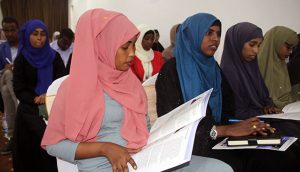
Closing the gender gap: New profiles of Somali women on Wikipedia
On International Women’s Day, 8 March, IMS-Fojo in Somalia and the Embassy of Sweden gathered some of Somalia’s leading ladies to make the online gender gap just that little bit smaller
There is a marked difference in the number of Somali men and women profiled on Wikipedia. Not surprisingly, a new IMS-Fojo study shows that the same applies for the number of female sources quoted and female writers used in Somali media. The lack of female voices represented on Wikipedia, a prime online reference point for people globally, means less opportunity for women to influence the public agenda or raise issues of specific relevance to women. On 8 March, a Women’s Day WikiGap event in Mogadishu addressed the imbalance of female voices online and in media by bringing together six leading women in Somalia for a panel discussion in front of more than 100 people from all different parts of Somali society.
By the end of the Somali WikiGap event, nine new portraits of Somali women had thus been added to Wikipedia, amongst these a profile of the chair of the Somali National Election Commission, the Minister for Ports and Marine Transportation, members of parliament, a writer and two poets. Read more about the women here.

Manja Kamwi, IMS-Fojo Somalia programme director said:
“Initiating this activity to reduce the internet gender gap by increasing the number of Somali women profiled on Wikipedia has been both exciting and challenging. Nothing like this has been done before in Somalia. It has really motivated the Somali women journalists involved to continue their research to ensure the important role played by women across all sectors of Somali society is better reported and recognized. For the women profiled, it has encouraged them to know that their respective areas of influence and impact in politics, media, arts, and development are now recorded for everybody to see.”
The Swedish Ambassador to Somalia, Amb. Andreas von Uexküll and the Mayor of Mogadishu also spoke at the event alongside the chair of Somali Women Journalists (SWJ), with whom IMS-Fojo launched the newly released Baseline Study of the Working Conditions of Women Journalists in Somalia.
Why is gender balance on Wikipedia important? Wikipedia is the world’s largest online and user-generated encyclopaedia. Its content has the potential to colour people’s view of the world as a leading reference point from which to gather information. Ninety per cent of those who add content to Wikipedia are men and there are four times as many articles about men as there are about women.The lack of proper female representation on Wikipedia both as profiled individuals and as writers leaves the impression that women make less of a footprint on society than men and as a consequence, have less influence.
The many WikiGap events across the world to increase online female representation on 8 March were one step on the way to closing the gender gap.




